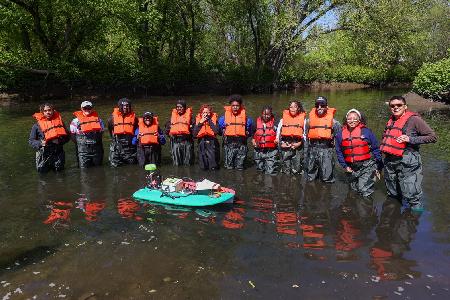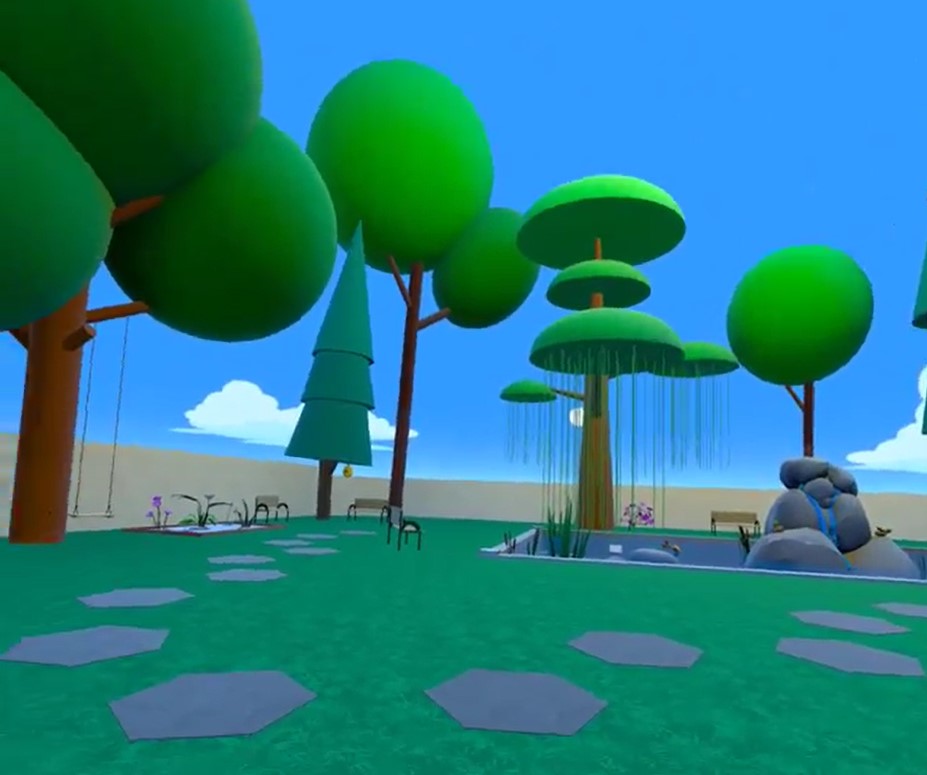When the COVID-19 lockdowns prevented North Carolina-based Robert Signore and his wife from visiting with their adult daughter on the West Coast, he sent her a Meta Quest headset so they could play Beat Saber and hang out in Horizon Worlds together.
They had so much fun playing together in virtual reality that his wife got a headset, too. Signore soon noticed that it boosted her mood a lot more than their family Zoom calls ever did.
“My wife was like, ‘Wow. She’s not in the room, but it sure feels like she’s in the room,'” he told Technical.ly.
In Signore’s professional life, he works as the chief product officer for K4Connect, a healthtech company in the senior living sector, where he develops technologies for senior communities to manage staff and engage with residents.
He knew how isolated senior living residents were during the pandemic. One of the main features of senior living communities — built-in social networks and activities — stopped, and people sat, alone, in their rooms.
That’s when Signore put two and two together. If VR could help his long-distance family feel like they were in the same room, can it help seniors feel less lonely and more connected?
A world for older adults
Signore created Thrive Pavilion in 2022 as that place for older adults to connect. He brought on experienced Horizon Worlds designer Dean Tudor to build the space as a calm, inviting, familiar-feeling space, including an “outdoor” courtyard with a fountain, which Tudor virtually decorates for each season.
There’s also a community center-like space where people like Linda Fisher, a retired court reporter in Queens, comes for social events and get togethers.
“I live alone,” Fisher, who visits Thrive Pavilion a few times a week, told Technical.ly. “This is something to do instead of TV time.”
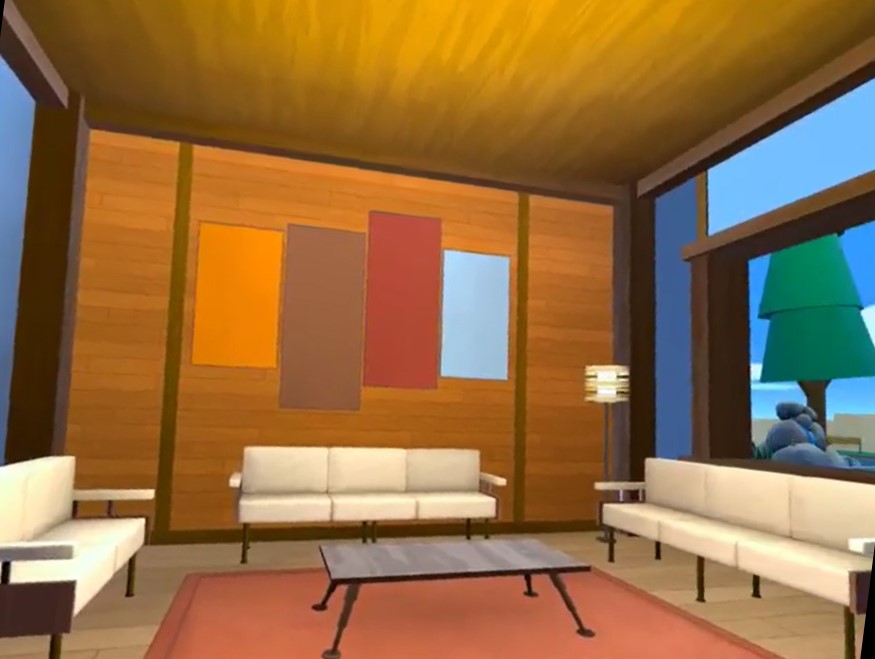
A virtual room for book club meetings. (Screenshot)
Fisher runs a Facebook group for fans of Wander, a popular Quest app that allows people to explore Google Earth in VR. Still, she found it challenging to find places to socialize in Worlds.
“I had some bad experiences at first,” she said. “I think the senior population in VR leans away from the gaming and more toward the nature and travel part of it, so having trees and this kind of space is inviting.”
Fisher and other early adopters of the Pavilion world have their own headsets, some given as gifts by friends, children and grandchildren with the hope that they can use it to ease loneliness.
Members range from late 50s to people in their 90s, with some more comfortable with technology than others. In the Pavilion, no one judges if a new member needs time to get the hang of the VR controls. They hang out in the courtyard and chat, enjoy events, meditation, book clubs, guest speakers and regular group “trips” to other worlds, where they might learn to play spades, bocce or cornhole in VR.
Vignettes of memories past
Last Halloween, Fisher got the idea that members could share their favorite memories of the holiday. That simple idea evolved into a VR and spoken word art project called Vignettes.
The Vignettes world, created by Tudor along with several other VR creators, is now a virtual gallery with interactive memories created by members of the community. Parts of the project came together in the Pavilion’s special projects room, one of the activities that brings members to the world each week.
One of the two inaugural memories, which launched with an in-world opening event in March, is Fisher’s. At the end of a hall is a virtual window into a scene of the 1964 World’s Fair in New York. When the visitor presses a button, Fisher’s voice tells a story about the day her family visited the fair and what she remembered most about it.
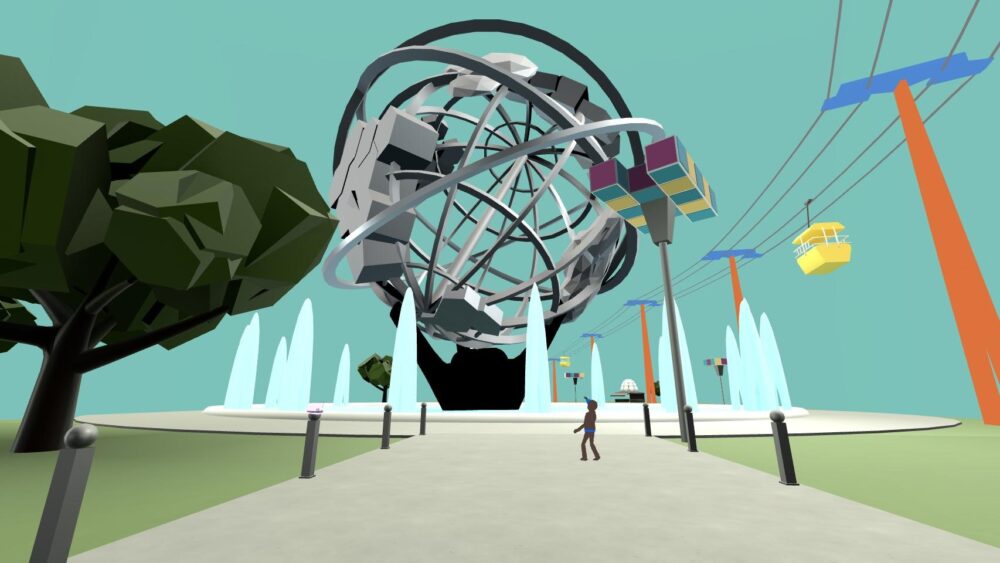
Linda Fisher’s memories of the 1964 World’s Fair in Vignettes. (Screenshot)
The second story goes back to 1930, when 92-year-old Frances Amello was a young girl playing her part in the Feast of St. Fortunata parade in Manhattan. After listening to the story, the visitor can step into the scene, hear the sounds of the marching band and grab a small Italian flag to wave at the parade.
The pieces are a moving intersection of the present and past, of modern technology and memories of times before tech became a ubiquitous part of people’s lives.
The evolution of the Pavilion
During this first year, Signore, Tudor and members of the Pavilion are figuring out the best ways to manage the space and its events, learning along the way. One upcoming change is to offer earlier events that align with the Greenwich Mean Time zone to better accommodate members in the UK and Ireland. (At the moment, Horizon Worlds is only available in the US, Canada, UK, Ireland, Spain, France and Iceland.)
The plan is that Thrive Pavilion will become increasingly accessible to senior adults, possibly through things like partnerships with senior living communities.
Beyond the pandemic lockdowns, “there are still a significant amount of older adults that are socially isolated, either because they have physical challenges, health and medical conditions, or a lack of transportation,” Signore said. “Or it could just be that the people that they used to socialize with live far away, or it even may just be too hot or too cold out.”
While participation in the world is still limited to people with access to a headset, anyone can join the Thrive Pavilion Facebook group, where there will be more ways to participate via mobile or laptop as Horizon Worlds becomes increasingly multi-platform.
Still, Fisher hopes to see more people with VR access, she said: A non-immersive experience is “just not the same experience.”
Join the conversation!
Find news, events, jobs and people who share your interests on Technical.ly's open community Slack

Delaware daily roundup: Free biz analytics tool; AI tools for HR; Goodwill's recycling plan
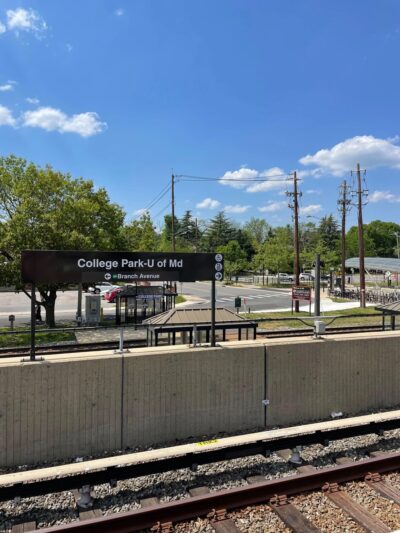
DC daily roundup: Auxa Health's seed raise and Nasdaq shoutout; the $500M Tech Hubs race; TikTok ban's impact on the marginalized

Delaware daily roundup: Vital conditions framework; Seaford center breaks ground; Staff shortage at the beach
